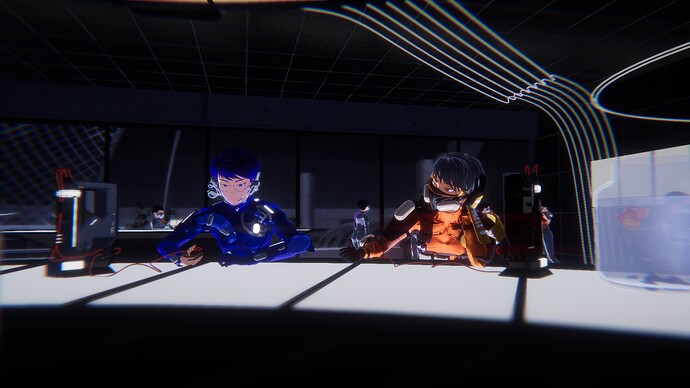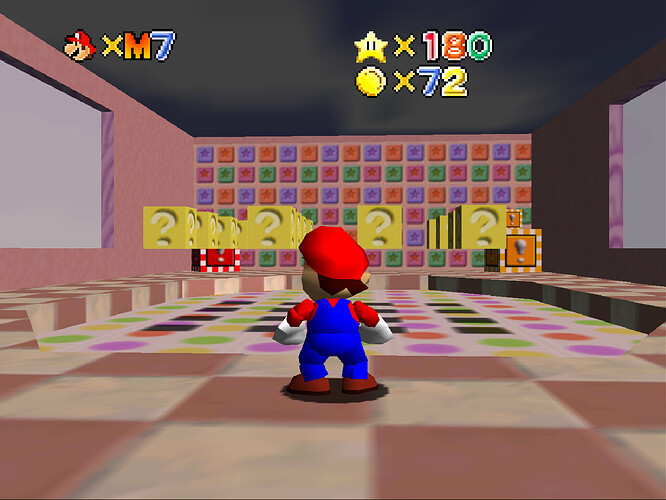I finished it and people shouldn’t forget about 1000xRESIST
Ostensibly about an in-bred society of clones and their cult, the game really twists around and has you living through a first contact scenario, a fascist regime change, a class war, a diaspora, a pandemic, a failure to remember, all explicitly through the lens of the 2019 Hong Kong protests.
The game uses meagre tools to tell story: text box, camera angle, lighting, and static dolls. A key conceit is diving into the memories of the girl the clones descend from, their God, prior to her arrival in the bunker in which they all now reside. A lot of sections are told like storybooks where you ‘flip the page’ on a scene to see time move forward or backward (or non-linearly) to learn the history of the world by combing through each step of the timeline in detail (you are the Watcher and your job is to watch). Many shift camera perspective to emphasise the immediacy (and sometimes the unreliability) of memory. Some are redacted. Some are without chronology. Others can only provide one perspective. Others are never shown. It all goes a bit Nierways. This form becomes theme as the process of living repeatedly through memory, history, family, tragedy, creates a potent germ of reflection. The writing does an excellent job of interpellating you, priming you for when key tenets are challenged or misremembered or subverted. There’s a poem (a religious text really) to interpret that you encounter fairly early on which establishes the recurring ideas and myths that form the basis of later ones or re-examining past idioms.
This is a really hard game to discuss properly without fully spoiling it. It’s relatively narrative heavy and much of the game-interest stems from how recurring environments and navigation helps formalise some of the plot beats so if that all sounds like a bunch of boring stuff, you should avoid the game. If you want a matrix of themes that’s confidently written every inch of the path, then go play it (I recommend talking to all NPCs when the game prompts you). It’s about 12 hours. It’s stuck in my thoughts and so here’s my thought dump for the rest of you.
SPOILERS
The memories go much deeper than the teenage girl godhead (Iris) the clones all worship; eventually you access memories from before her birth and Iris’ own mother. I thought the scale of the game was going to be much smaller than it was because of the patterns they establish in the first five chapters. There are six sisters who oversee all other clones in this facility and you play one of them. The initial chapters have you revisiting a specific portion of memories with a specific sister so you can kind of countdown until the end of the game. The game begins with you murdering Iris and implies it will end up there. It actually plays out the consequences of the murder for the society you’ve spent five chapters learning about. Now you get to jump into the future with memories of your own. You take on a new player character (Blue), years later, in the same society but with a different political regime.
Neat things:
-
There’s a section where you play out Iris’ memories leaving her parent’s flat after the Canadian government identify her as the only immune human and imply she has to take a one way ticket to research subject. Her parents initially refuse and it’s a source of tension. You play this section in first person and the flat is not big. Physically leaving the flat becomes a maze of scenes where the flat’s exit just leads back into the flat, so you have to leave again but with the diorama laid out in a different way. The game recurrently does animates still dioramas forcing you to pass through multiple versions of the same scene in different stages in time. It’s a really effective visual storytelling aid (there’s no animation other than the player’s movement) that I don’t see many games use very much.
-
The background of the dev team is in theatre/performing arts and so the staging in a lot of scenes works well to dramatically pose static characters in lieu of animated cutscenes (think NPC conversations in killer7). This is a long tradition going back to sprites/models pantomiming in whatever FF predated voice acting. Scenes get a lot out of simple character arrangement, poses, tone of delivery, and music.
-
To act as a contextual indicator, you have a floating drone called ‘secretary’ that indicates when you can speak or interact with others. Your boss is the only other person who has a secretary which reaches out to you when you approach them which felt freaky. Like some other videogame character just violating my personal space.
-
Jiao just wanted to be friends ;(
-
The irony of Iris’ parent’s leaving Hong Kong because of China’s encroachment and Iris eventually causing the events that lead to an authoritarian big brother is not the subtlest, but I think it worked for me and kinda needs to avoid equivocation. Not only does Iris end up cruel and frustrated like her mother, frequently turning to angry violence to solve problems or incur discipline. I think the game is basically gesturing that individual and broader social problems are memetically inherited via bad ideas and bad actions. That said, there are a lot of explicit parallels with China and the clone society that some might criticise as bashing you over the head: overpopulation becomes a concern; red is the colour of the post-Iris oppressive regime symbolically meaning blood and unity to mask corrupt authority; Carrie Lam’s own metaphor for herself as Hong Kong’s mother and Iris’ framing as ‘allmother’; repurposing of theatre for propaganda; it goes on. History never gets better.
-
Clones without necessary skills are assigned functions somewhat improperly. Iris (being kinda a dumb and angry teenager) sets the ground rules for all responsibilities in a very simplistic fashion which is problematically inherited. All clones are either military, medical, engineering, research or watching… focused. Colourblind shells are assigned tasks they can’t do, BBF’s idiosyncratic communication style and pacifism make her a bad military leader, the first Watcher’s poor vision. Even just the role of ‘Watcher’ seems kinda dumb when you first play and it turns out it is just a made-up role that everyone kinda retroactively justifies. None of the societies assign function according to merit even though they all claim to and people are effectively forced to take on roles even when they clearly aren’t good at them. Some of the metaphor gets messy with the fact that a lot of character difficulties are implied to be a result of an imperfect cloning process.
-
I mentioned that the voice acting sounded amateur before and you do still get that feeling from it but I think it’s more just voice direction is naturalistic. The whole voice direction changes drastically after you start discovering the truth about a lot of things and it becomes downright cynical by the time of the new provisional government. Watcher’s VA in particular did an excellent job, gets across the understated emotional instability that comes with loneliness really well.
-
There’s a harrowing interrogation sequence which takes place after Watcher’s assassination of Iris which seems to owe a lot to Thirty Flights of Loving. Up until this point most memory sequences stick to one location or time period even if they play out of sequence. Here the game starts to begin its big thesis statement that all memories reflect back on each other as you are slowly gaslit into denying history. The blend of narratives also has one of the saddest dance scenes I’ve seen in a game.
-
After Blue discovers a friend’s corpse shot in the back which the police rule as a suicide, she enters a rage. The camera closes in as we walk back home, and the writers use the objective notification system to communicate inner thoughts. Most of them are terrible ideas and they get abandoned as quickly as they appear. Just a quiet anger racing through how to reach justice under oppression.
-
Prior to the post-Iris takeover, you get a lot of time to freely explore bunker which is a very competitive environment by design to get you to develop familiarity with it rather than zoom through from A-B. This is frustrated further when the new provisional government takes over and checkpoints restrict access in the bunker. Some simple paths just have arbitrary police stopping you. What was free to explore is now a pain because security is suddenly very important.
-
Seemingly minor or joke NPCs are brought back as key players in the final acts. This is one of the reasons why it’s important to talk to every NPC since many of them come back as major threats or provide insight into how each individual is affected. Many are opportunistic and trade one hierarchy for another just so that they can climb the ladder. There’s even a group of NPCs that put on impromptu theatre performances which seem cute at first but later take on really disturbing overtones as they are used in the main plot to reinforce propaganda of the state.
-
It ain’t all great. The train level is a drag, and the long walks remind me of The Fall. Scifi ambitions weighed down by lots of tracking back and forth to interaction points. The game is at its strongest when it is knocking down the dominoes it has required you to (sometimes) laboriously set up.
-
You eventually enact one last plot to end the cycle of suffering this society creates and you do a final ‘end of Metroid’ ascension through the game’s environments where all narrative threads weave a new ‘us’. Every line of dialogue takes on new meaning in this final sprint as key lines from every character and scene make a cathartic reprise.
-
The first contact scenario carries echoes of Lem initially when the Occupants are revealed to have tried their own techniques like creating human bodies (of the wrong scale) and broadcasting memories to communicate with humans. But it does become standard eventually when they talk and the language gap is bridged; it becomes more Darmok and Jalad than Solaris. I was worried they would be dropped completely as a plot thread but the game carries them as a convincingly alien threat until the end. They have no concept of death so don’t really conceive of what they’ve done (chemical extermination of all humans) as tangibly wrong, just an unfortunate side effect of efforts to communicate each other’s memories. They covet memories and just want to preserve humanity as a terrible archive forever through Iris, the only person they couldn’t kill whose tragic life they fetishise for the memories it generates.
-
Secretary has a fairly natural sounding child voice which kinda endears you to it. They do another recurrence of the theme by having the alien ‘Source’, from which it originates, be a parent voice of a mother and father. Secretary, of course, carrying all the memories of rejected mothers, ends up killing its own.
-
The ending shows violence as a solution to long-term political change. You essentially get a Deus Ex Machina to determine which aspects of society you want to keep or remove. If you choose to do nothing when you just get killed immediately by the police and the radical violent contingent within society. You are gently pushed toward eliminating the police and dictators.
I should’ve gone to bed but I’m writing all this stuff. That’s enough gush. 1000xRESIST is motherhood and memory trapping us in pain.






























